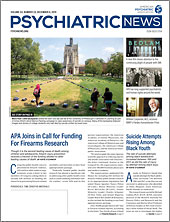Although varenicline is known to promote smoking cessation in adults when combined with counseling, few studies have examined the effectiveness of the medication in young smokers. A report in JAMA Pediatrics found that while varenicline is well tolerated by adolescents, youth who took the medication were no more likely to stop smoking than those who took placebo.
A research team at the Medical University of South Carolina (MUSC) in Charleston enrolled 157 treatment-seeking youth aged 14 to 21 (average age of 19). The youth were assigned to receive 12 weeks of either varenicline or placebo in combination with weekly smoking cessation counseling sessions. The main smoking measure was continuous seven-day abstinence at the end of treatment, which was biochemically confirmed by measuring the levels of the nicotine byproduct cotinine in urine.
At the end of the study, the percentage of participants who had stopped smoking for seven consecutive days was identical for both groups: 8.9% in the varenicline group and 8.9% in the placebo group.
Lead investigator Kevin Gray, M.D., a professor of psychiatry at MUSC, noted that the low overall smoking abstinence rate and the lack of a difference between the varenicline and placebo groups were disappointing but anticipated. “There has been a dearth of smoking-cessation studies in youth, but when they are done, the effects are always much smaller than comparable trials in older adults,” he said.
Gray explained that youth tend to be more influenced by peers and fluctuate in their motivations to quit smoking. “Adults, particularly long-time smokers, start to feel the physical costs of smoking and have more impetus to change,” he told Psychiatric News. With hectic schedules and many social distractions, youth are also less likely to come to clinics to attend counseling sessions, he suggested.
The youth who took varenicline did show some improvements; they achieved seven-day abstinence quicker on average (39 days versus 59 days) than those in the placebo group and were more likely to report being abstinent during post-study follow-ups at 18 and 26 weeks (though abstinence was not confirmed with urine tests).
“Although varenicline treatment for young smokers deserves further investigation, its general use with this population cannot, at present, be endorsed,” Megan Piper, Ph.D., of the University of Wisconsin’s Center for Tobacco Research and Intervention and colleagues wrote in an editorial accompanying the study.
Gray agreed that varenicline is not a good first-line option for youth who want to quit smoking. He thinks this medication could be used as a secondary option by smokers who struggle with psychosocial therapy, especially for those who have bad withdrawal symptoms and consistent problems with cravings (varenicline has been shown to help with cravings and withdrawal in smokers). Gray noted that his study found that varenicline was well tolerated, and there were no reports of a serious adverse event due to medication.
This study was supported by grants from the National Institute on Drug Abuse, National Institute on Alcohol Abuse and Alcoholism, and the Eunice Kennedy Shriver National Institute of Child Health and Human Development. The varenicline and placebo pills were provided by Pfizer. ■
“Efficacy and Safety of Varenicline for Adolescent Smoking” is posted
here. The accompanying editorial, “Progress in Treating Youth Smoking: Imperative, Difficult, Slow,” is posted
here.
